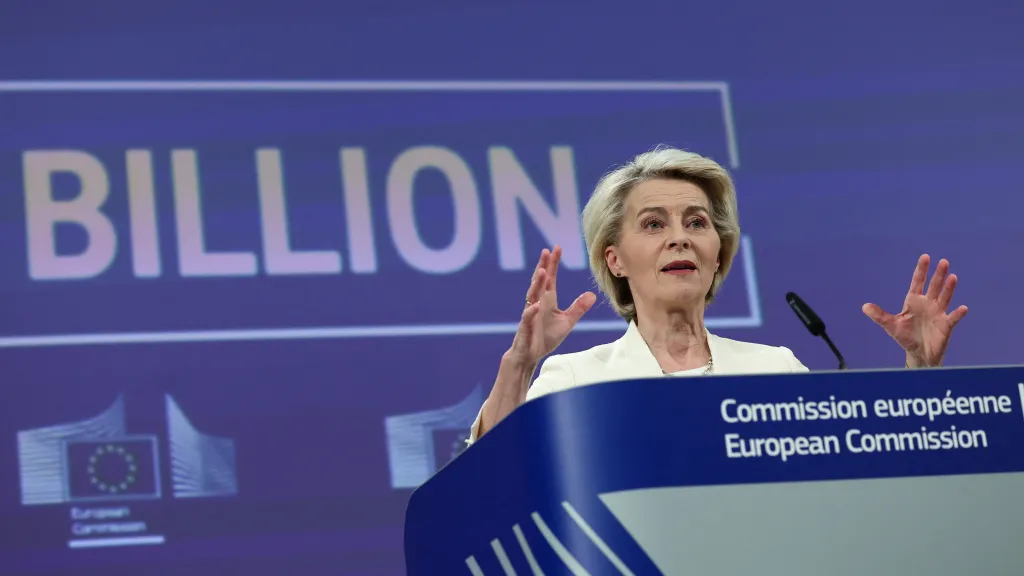
The European Commission has proposed a budget for the period 2028-2034 of two trillion euros (49.21 trillion crowns), said EU Budget Commissioner Piotr Serafin. The financial plan emphasizes economic competitiveness and defense, while also seeking to reform the rules on subsidies for agriculture and economic development. In the coming months, one of the most complex negotiations to take place in Brussels will begin.
The budget, which exceeds the one approved for the current period by 0.8 trillion euros (almost twenty trillion crowns), will be based on three main pillars - support for member states through regional cooperation, support for European businesses through competitiveness funds, and support for global partners, Serafin explained.
This is an initial proposal from the Commission, which will be followed by up to two years of negotiations between the EC, the European Parliament and the Member States, who must unanimously agree on the final text.
The Commission proposes that three hundred billion euros (3.4 trillion crowns) go to agriculture, 218 billion euros (5.4 trillion crowns) to support less developed regions and 451 billion euros (11.1 trillion crowns) to the European Competitiveness Fund.
The new budget also allocates 131 billion euros (3.2 trillion crowns) for defense and space, a fivefold increase from the current level. “We are allocating 100 billion euros (2.5 trillion euros) for Ukraine,” said EC President Ursula von der Leyen.
"This is a modern, more flexible budget that will meet the challenges of today and tomorrow," Serafin told MEPs. According to him, every euro must be easily accessible and the funds must be spent on things that are important to Europeans.
Condition of respect for the rule of law
All EU funding will be linked to respect for the rule of law, von der Leyen added, adding that aid to poorer regions and agriculture remain at the heart of the budget.
The 27 traditionally plan in long cycles because negotiations are very complex and lengthy. The goal is to ensure continuity and that money is directed to long-term strategic areas that will not change from year to year, Czech Television foreign correspondent Petr Obrovský explained the process.
9 minutes
Difficult negotiations
Complex negotiations preceded the publication of the draft multiannual framework, wrote Politico."We still have not received any official proposal to analyze. Given the importance of this file, this form of interinstitutional cooperation is unsatisfactory," wrote MEP Siegfried Mureșan on Wednesday shortly before noon on X.
MEP Veronika Vrecionová (ODS) criticized the fact that the Commission brought the proposal a week before the start of the parliamentary recess. European Commissioner Serafin also postponed the presentation of the multiannual financial framework proposal in the EP committee during the day.
Greater flexibility
"We need space to respond to unexpected events, act quickly in a crisis and change our priorities - it's about flexibility," Serafin emphasized."The biggest problem is that it's seven years, starting in 2028. Now the bear is being carved up, basically planning for nine years ahead," pointed out Martin Vokálek, an analyst at the Europeum think tank.
"We see that when the ending multiannual financial framework was planned, it was in the pre-Covid period. We never imagined that there would be a global pandemic or a full-fledged military aggression against Ukraine... which are very critically moving the world order and fundamentally changing the priorities of where money needs to be directed," the analyst explained.
In February 2024, EU leaders therefore agreed to revise the current multiannual financial framework for the period 2021 to 2027. This was the first such change in history, increasing the budget by 64.6 billion euros (1.59 trillion crowns) for instruments to support Ukraine or after the coronavirus pandemic.
Withdrawing money
The use of European funds is in the hands of the member states and their final beneficiaries. However, according to Vokálek, the Czech Republic is not the best example of how to properly use available funds. Because local mechanisms and individual companies, enterprises and other beneficiaries are said to be unable to fully utilize the capacities that the Union offers.
"The fact that we are a younger member state and that the systems are not yet well-established does not allow us to fully utilize the opportunities that we have from the budget," says Vokálek. Nevertheless, according to Obrovský, EU subsidies in the country provide approximately half of public investments.
The Union also has its own annual budget, but its negotiation is more of a technical process and must be based on a seven-year budget, which is an expression of what the Union considers to be its priorities, where it wants to go in the next period, and where it wants to get the money for it.
The multiannual framework largely finances support for farmers and cohesion policy measures. It also pays for research projects under Horizon Europe and student placements under Erasmus. States can also draw on the budget to help after natural disasters, such as last year's floods in the Czech Republic.
